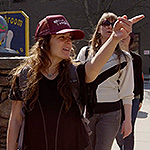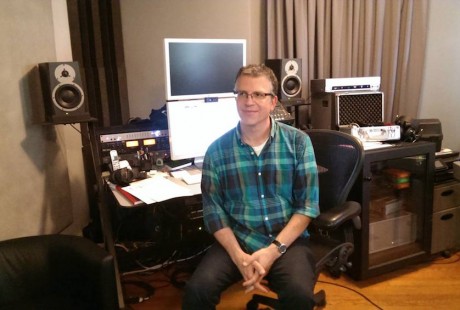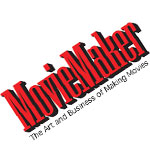asheville studio | 2BruceStudio - Part 2
Deep Breath, Original Music, and Release
On 28, Oct 2014 | In 2BruceStudio News, Asheville Production, Composing | By Bruce Sales
-

Click for Video
Alternate Moby tracks tried, but stumbled. Only custom music would work.
With a deadline approaching, the director recommended hiring a highly reputable collaborator. The producer contacted Bruce Sales of 2BruceStudio, to score original music and sound design, and deliver the final audio mix for a tight but fair budget. A few soundtrack demos, and two weeks later, hugs and laughs went all around and 2BruceStudio delivered the final audio mix.
From the jingle house to the Miles Building
On 09, Aug 2014 | In 2BruceStudio News, Asheville Production, Composing | By Bruce Sales

SOUND GUY: Bruce Sales sits in his studio space in the Miles Building in downtown Asheville. Photo courtesy of Bruce Sales
You probably won’t find a rock band in Bruce Sales’ 2BruceStudio, but that doesn’t mean he isn’t keeping busy. “My studio is more geared for postproduction,” says Sales. “I work with filmmakers and people doing video. So it’s [creating] the sound for the picture. They need sound design or voice recording or original music, or they just need me to mix it. Or fix it — I’ve been doing a lot of fixing lately.”
After majoring in songwriting at Berklee College of Music in Boston, Sales landed a gig at David Horowitz Music Associates, a commercial “jingle house” in New York City. He spent the next 15 years composing and engineering for big-name clients like Pepsi and GE, as well as small films.
And while the Asheville native says out-of-towners such as HBO and The History Channel still call on him regularly for voice recording work, he’s also made his mark in the local community. Besides producing the Asheville 48 Hour Film Project, Sales sponsors the Asheville Music School’s summer camp program, giving young musicians their first recording experience. The kids, he says, “just kind of walk in and play, and they get their mix. The largest group I had in here was 12 kids: They’re all lined around the walls, and I recorded them all at once playing a couple of songs. In the last 15 minutes, I mixed it together and gave them a version they can give their parents.” He also works with local musicians (including a lot of rappers and hip-hop artists lately, thanks to his knack for high-quality vocal recording), and businesses such as The Biltmore Co. and Travelling Yogini tours.
Asheville #1 Town to Live and Work as a Moviemaker
On 30, Mar 2014 | In 2BruceStudio News, Film | By Bruce Sales
 It’s nice waking up in MovieMaker Magazine’s “#1 Town” for filmmakers to live and work. But I must say, we wake up every day knowing full well it could turn out more like #2, or worse. How stiff was the competition? Where is another town with a population of 100,000 or less earning nicknames like “The Paris of the South”, “The San Francisco of the East”, or “Beer City USA”? MovieMaker Magazine explains:
It’s nice waking up in MovieMaker Magazine’s “#1 Town” for filmmakers to live and work. But I must say, we wake up every day knowing full well it could turn out more like #2, or worse. How stiff was the competition? Where is another town with a population of 100,000 or less earning nicknames like “The Paris of the South”, “The San Francisco of the East”, or “Beer City USA”? MovieMaker Magazine explains:
Voted the most beautiful place in the United States by Good Morning, America, Asheville sets the gold standard for best small town moviemaking. From the Pisgah National Forest to the Blue Ridge Parkway, the Art Deco downtown to the Biltmore Estate, it has a vibrant history with productions like Last of the Mohicans, The Green Mile, The Hunt for Red October, The Hunger Games—and who could ever forget the Dirty Dancing lift scene from Lake Lure?
With nearly a dozen local film festivals (including the Chuck Norris-inspired ActionFest), community support from the Asheville Cinema Society, the Asheville Film Society, Asheville Area Arts Council, Screen Artists Co-op, and Western North Carolina Film Commission, the town is chock full of pre- and post- production facilities and some of the friendliest crew around. “The Hunger Games would not have been possible without all of the support from the local community and WNC Film Commission,” said director Gary Ross.
I was born in Asheville, moved away and came back in 2005. I haven’t seen everything, but driving this evening, as the highway reached a favorite panorama, the sunset over mountain peaks seemed to have everything. And when I walk through the forest here, there’s a hint why Cherokee Indians still hold such deep reverence for Western North Carolina. It’s not an easy living for filmmakers in Asheville, but it can be a good life.

